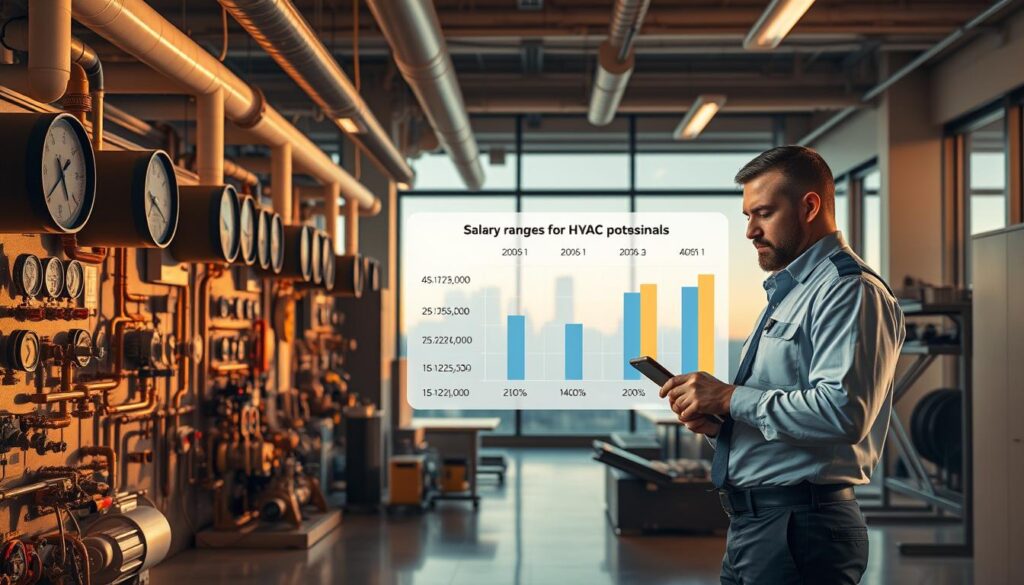Affiliate Disclosure
HVAC Guide Guys is a participant in the Amazon Services LLC Associates Program, an affiliate advertising program designed to provide a means for sites to earn advertising fees by advertising and linking to Amazon.
How Much Does a HVAC Worker Make a Year? Ever wondered how much HVAC workers make a year? Or what affects their salary? The HVAC industry offers more than you might think.

Exploring HVAC salaries, you’ll find a career with great earning chances. Salaries vary based on experience, location, and specialization. On average, HVAC technicians make between $46,000 and $68,000 a year.
It’s important to know about salary trends if you’re in or thinking about HVAC. From beginner to advanced roles, HVAC careers offer many chances to grow financially. You might be surprised at the opportunities.
Key Takeaways
- HVAC technicians earn between $46,000 and $68,000 annually
- Salary varies based on experience, location, and specialization
- Career offers significant growth opportunity
- Certifications can boost earning
- Demand for skilled HVAC professionals keeps growing
Table of Contents
Understanding HVAC Technician Career Prospects
The HVAC industry is booming, with great opportunities for those looking for a stable job. As technology improves and we focus more on the environment, HVAC techs are in high demand. Knowing the current and future job market is key to success in this field.
Job Market Overview
The need for skilled HVAC workers is growing in the U.S. The job market is expected to keep expanding, making HVAC a promising field. Several factors are driving this growth:
- More homes and buildings are being built.
- Old systems need to be replaced.
- There’s a big push for energy-saving solutions.
- New technologies in heating and cooling are emerging.
Career Growth Opportunities
Your earnings as an HVAC installer can rise with experience and skills. There are many ways to advance in your career, from starting as a technician to becoming a senior specialist or even a business owner.
| Career Stage | Potential Roles | Income Range |
|---|---|---|
| Entry Level | Apprentice Technician | $30,000 – $45,000 |
| Mid-Career | Senior Technician | $45,000 – $65,000 |
| Advanced | Master Technician/Supervisor | $65,000 – $85,000 |
Industry Demand Factors
Several key factors are shaping the HVAC job market. Environmental regulations and energy efficiency standards are opening up new roles for skilled workers. The move towards green technology means there’s a high demand for technicians with advanced certifications and knowledge of sustainable tech.
The Bureau of Labor Statistics projects HVAC technician jobs will grow 5% from 2020 to 2030, faster than many other occupations.
Explore Our HVAC Shop
Looking for top-rated HVAC tools, parts, and accessories? Visit our shop and find the perfect solution for your needs.
Visit the ShopNational Average HVAC Technician Salary Overview
Understanding hvac engineer earnings is key to planning your HVAC career. The national HVAC job market offers good pay for different skills and areas of focus.
The median salary for HVAC techs is $48,730 a year, or $23.43 an hour. This shows that skilled workers can earn a good income.
| Salary Tier | Annual Earnings | Hourly Rate |
|---|---|---|
| Bottom 10% | $30,610 | $14.72 |
| Median Salary | $48,730 | $23.43 |
| Top 10% | $77,920 | $37.46 |
Your hvac maintenance wages can change a lot. This depends on:
- Where you work
- How long you’ve been working
- Any special certifications you have
- If you work in homes or businesses
Those at the top of the pay scale show that growing your career can really pay off in HVAC.
Explore Our HVAC Shop
Looking for top-rated HVAC tools, parts, and accessories? Visit our shop and find the perfect solution for your needs.
Visit the ShopHow Much Does a HVAC Worker Make a Year Based on Experience Level
Your salary in the HVAC field changes a lot as you move up in your career. Knowing how salaries grow helps you plan your career and set income goals.
The HVAC field offers big chances for making more money. As you get more experience and skills, your yearly income goes up a lot.
Entry-Level Positions (0-5 years)
Starting in HVAC, you’ll get good pay for beginners. New technicians usually make between $40,000 and $50,000 a year. Your first salary depends on:
- Educational background
- Technical training
- Geographic location
- Initial skill set
Mid-Career Development (6-9 years)
As you get more skilled, your pay goes up. Mid-career technicians make between $55,000 and $65,000 a year. Your salary is influenced by:
- Advanced certifications
- Specialized technical skills
- Performance track record
- Company reputation
Senior Level Earnings (10+ years)
Experienced HVAC pros earn a lot. Senior technicians and managers make $65,000 to $85,000 a year.
| Experience Level | Annual Salary Range | Typical Hourly Rate |
|---|---|---|
| Entry-Level (0-5 years) | $40,000 – $50,000 | $22.00 |
| Mid-Career (6-9 years) | $55,000 – $65,000 | $27.65 |
| Senior Level (10+ years) | $65,000 – $85,000 | $32.83 |
Pro Tip: Always keep learning and improving your skills. This is key to getting the most out of your HVAC career.
Top-Paying States for HVAC Technicians
If you want to earn more as an HVAC technician, knowing the best-paying states is key. The pay for HVAC jobs varies a lot across the U.S. Some areas offer much higher salaries for skilled workers.
Your salary can change a lot based on where you work. Some states pay more and have strong job markets.
| State | Average Annual Salary | Key Factors |
|---|---|---|
| California | $59,200 | High demand, complex infrastructure |
| New Jersey | $58,300 | Dense urban areas, strong construction sector |
| Washington | $58,000 | Tech industry growth, modern building requirements |
| Massachusetts | $57,500 | Robust commercial and residential markets |
| New York | $56,900 | Complex urban infrastructure, high living costs |
Several key factors influence these competitive salaries:
- Cost of living in metropolitan areas
- Local economic conditions
- Complexity of HVAC systems
- Regional climate variations
Planning your HVAC career wisely can help. Choosing a state with higher salaries can greatly increase your earnings. But remember, salary isn’t everything. Consider job availability, living costs, and career growth too.
Explore Our HVAC Shop
Looking for top-rated HVAC tools, parts, and accessories? Visit our shop and find the perfect solution for your needs.
Visit the ShopSalary Variations by Metropolitan Areas
Your HVAC technician salary can change a lot based on where you work. Location is key in figuring out how much you can earn. Different places have their own pay scales based on the local economy, job demand, and cost of living.
Urban, suburban, and rural areas each have their own chances for HVAC techs. Knowing these differences can help you choose the best place for your career. This way, you can make the most of your salary.
Major Urban Centers
In big cities, HVAC pros usually earn the most. San Francisco tops the list with entry-level salaries averaging $64,200. New York City is close behind, with entry-level wages around $60,600.
- San Francisco: $64,200 average entry-level salary
- New York City: $60,600 average entry-level salary
- Chicago: $55,400 average entry-level salary
- Los Angeles: $57,800 average entry-level salary
Suburban Markets
Suburbs offer good pay with possibly lower living costs. These areas provide steady jobs for HVAC techs looking for fair pay and a good life.
| Suburban Region | Average Salary | Cost of Living Index |
|---|---|---|
| Northern New Jersey | $58,200 | 125 |
| Silicon Valley Suburbs | $62,500 | 140 |
| Atlanta Suburbs | $52,400 | 90 |
Rural Area Compensation
Rural areas might pay less but offer lower living costs and special chances. HVAC techs here often have steady work with less competition.
“Location can be just as important as experience when determining your earning in the HVAC industry.” – HVAC Career Insights
Your earnings will depend on many things, like your skills, certifications, and the local job market. Looking into regional opportunities can help you plan your HVAC career wisely.
Impact of Certifications on HVAC Salaries

Certifications can greatly increase your hvac installer income. They also open doors to better-paying jobs in the HVAC field. Professional credentials show your skills and dedication, making you more attractive to employers.
The EPA 608 Certification is key for all HVAC technicians. It shows you can work with refrigerants safely and legally. Having this certification often leads to higher pay from employers.
- EPA 608 Certification: Essential for all refrigerant handling
- NATE (North American Technician Excellence) Certification: Advanced technical validation
- HVAC Excellence Certification: Specialized skill recognition
“Certifications are your passport to higher earning in the HVAC industry.” – HVAC Professional Magazine
Getting advanced certifications can boost your earnings by 10-20% each year. Specialized skills in areas like commercial refrigeration or energy efficiency are highly valued by employers.
Investing in certifications can change your career path. By always improving your skills and credentials, you’re ready for more rewarding HVAC jobs and career growth.
Explore Our HVAC Shop
Looking for top-rated HVAC tools, parts, and accessories? Visit our shop and find the perfect solution for your needs.
Visit the ShopCommercial vs Residential HVAC Pay Scales
HVAC professionals have many career paths with big pay differences between commercial and residential sectors. Knowing these differences can help you earn more as an HVAC engineer. It also helps you find the most profitable jobs in the field.
The HVAC job market has different pay structures based on the work setting. Residential and commercial sectors offer unique challenges and pay levels for skilled technicians.
Commercial Sector Earnings
Commercial HVAC technicians earn more because of the complex systems they work with. They handle big, advanced equipment in places like offices, hospitals, and factories.
- Average annual earnings range from $55,000 to $75,000
- Specialized commercial systems demand advanced technical skills
- Opportunities for overtime and project-based compensation
Residential Market Rates
Residential HVAC work offers steady jobs with regular pay. Technicians in this area focus on systems for homes, including heating, cooling, and ventilation.
- Typical annual earnings between $45,000 and $65,000
- More predictable work schedules
- Strong demand in residential construction markets
Specialized Installation Income
Technicians with advanced certifications in specialized installations can earn more. Green energy solutions and industrial HVAC systems are among the most profitable areas.
| Specialization | Average Annual Earnings | Required Certifications |
|---|---|---|
| Green Energy HVAC | $65,000 – $85,000 | Energy Efficiency Certification |
| Industrial Systems | $70,000 – $90,000 | Advanced Technical Credentials |
Your HVAC career path depends on ongoing learning, skill improvement, and choosing the right specialization. Investing in advanced training can lead to higher earnings in both commercial and residential markets.
Benefits and Additional Compensation

Looking at an HVAC contractor’s annual income, it’s important to see more than just the salary. HVAC jobs offer many benefits that make them appealing. These benefits go beyond just a paycheck.
Top HVAC companies give great compensation packages. These packages include:
- Comprehensive health insurance coverage
- 401(k) retirement plans with company matching
- Paid vacation and personal time
- Performance-based bonuses
- Overtime pay opportunities
HVAC technicians can earn more through bonuses and overtime. Performance bonuses can be 5% to 15% of their salary. Overtime can add 10-20% to their yearly income.
Getting special certifications or advanced training can also increase earnings. Employers may offer:
- Tuition reimbursement for professional development
- Training programs for advanced technical skills
- Career advancement opportunities
When looking at job offers, think about the whole package. A lower salary might be balanced by great benefits, retirement help, or chances for career growth in HVAC.
Explore Our HVAC Shop
Looking for top-rated HVAC tools, parts, and accessories? Visit our shop and find the perfect solution for your needs.
Visit the ShopCareer Advancement and Salary Growth Opportunities
Starting your HVAC career can lead to exciting opportunities and higher salaries. As you gain experience, you’ll find many ways to grow professionally and increase your earnings.
Begin with technical skills. Here are some career paths to consider:
- Specialization in advanced technologies
- Management and supervisory roles
- Entrepreneurial business ownership
- Technical training and certification programs
Getting specialized skills can really boost your income. Green technology and smart home systems are key areas with lots of growth. Those who keep learning see big pay increases.
Starting your own HVAC business is a top career goal. Successful owners can make more money by:
- Building a reliable client base
- Investing in advanced equipment
- Obtaining necessary state licenses
- Developing strong marketing strategies
Certifications are key for career growth. Getting certified by HVAC Excellence or NATE can make you more attractive to employers and increase your pay.
Your dedication to skill development determines your long-term success in the HVAC industry.
Strategic planning turns your HVAC job into a rewarding career. It’s all about planning your path wisely.
Conclusion
The HVAC industry is full of chances for a stable and fulfilling career. Knowing how much an HVAC worker makes a year shows a path to growth and financial success. Skilled technicians can earn competitive salaries, no matter their experience or specialty.
Your salary as an HVAC technician depends on many things. These include where you work, your certifications, and your expertise. The U.S. job market is strong for HVAC pros, thanks to more construction and retrofitting projects. By always learning and getting better at your skills, you can make more money.
HVAC workers are key to making buildings more energy-efficient. Your career can take you from working on homes to managing big commercial systems. To grow in your career, keep learning, stay up-to-date with new tech, and always aim to do your best.
The future of HVAC careers is bright, with more jobs and a need for skilled workers. By knowing about salaries, getting the right certifications, and being ready for new tech, you can have a great and well-paying career in this important field.

